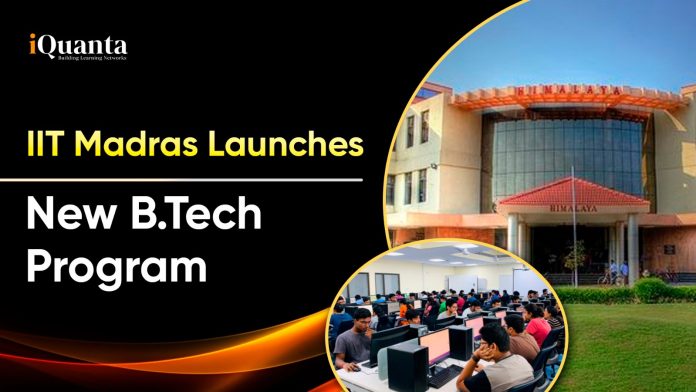The Indian Institute of Technology (IIT) Madras has announced the launch of two new undergraduate engineering programs for the academic year 2025-26. These programs will be offered by the Department of Applied Mechanics and Biomedical Engineering, which has been known for pioneering work in interdisciplinary research since the institute’s establishment in 1959.
Aimed at expanding academic opportunities in emerging fields, these programs will be open to students for the JEE (Advanced) and will also participate in the upcoming JoSAA 2025 Counselling. Each course will admit 40 students, which contributes tothe institute’s vision for future-ready engineers.

JEE Advanced 2025: 2 New BTech Courses in IIT Madras
| Program Details | B.Tech in Computational Engineering and Mechanics (CEM) | BTech in Instrumentation and Biomedical Engineering (iBME) |
| Course Code | 412U | 412V |
| Duration | 4 Years | 4 Years |
| Department | Department of Applied Mechanics | Department of Biomedical Engineering |
| Core Focus | Digital engineering combines physical systems with computational technologies and AI | Biomedical device development integrating electrical, instrumentation, and biomedical engineering |
| Key Curriculum Areas | – Solid and fluid mechanics- Electrical engineering (circuits, signals, embedded systems)- Material science and dynamics- Machine learning, data science, high-performance computing | – Electrical and instrumentation engineering- Biomedical engineering fundamentals- IoT, AI, web-enabled medical technologies- Application-focused, healthcare-centric design |
| Interdisciplinary Elements | Yes — integrates traditional engineering with computational science and AI | Yes — blends biomedical engineering with modern electronics, AI, and IoT |
| Career Opportunities | – Aerospace- Robotics- Automotive- Manufacturing- Digital twin design- Smart infrastructure- Sustainable energy and computing | – Medical device design- AI in healthcare- Rehabilitation technologies- Healthcare entrepreneurship- Innovation in diagnostics and therapeutics |
| Seat Intake | 40 Students | 40 Students |
| Eligibility | Must qualify JEE (Advanced) and participate in JoSAA Counselling 2025 | Must qualify JEE (Advanced) and participate in JoSAA Counselling 2025 |
JEE Adavnced 2025 IIT Madras New Course: B.Tech in Computational Engineering and Mechanics (CEM)
Course Code: 412U
Duration: 4 years
Department: Department of Applied Mechanics
This newly launched program is designed for students aspiring to work at the interface of traditional engineering and modern computational technologies. It prepares graduates for addressing real- world engineering challenges using a combination of mechanics, mathematics, data science and computational tools.
Program Objective
The CEM program aims to train students in digital engineering, a fast-evolving field where physical systems are analyzed and optimised using computational models, machine learning, and high-performance computing. It focuses on building future-ready engineers who can;
- Model complex systems digitally.
- Use AI/ML for predictive analytics
- Apply mechanics and data science to solve industrial problems.
Core Curriculum Components
| Curriculum Area | Key Subjects / Tools | Purpose & Learning Outcome |
| 1. Computational Methods & Tools | – Machine Learning- Data Science- High-Performance Computing (HPC) | Equips students with data-driven and simulation-based modeling skills for solving complex engineering problems. |
| 2. Mechanical & Physical Foundations | – Solid Mechanics- Fluid Mechanics- Dynamics | Helps students understand how mechanical systems behave under various forces and environments—essential for design and analysis. |
| 3. Electrical Engineering Fundamentals | – Circuits- Signals- Embedded Systems | Enables students to design and interact with smart systems that include sensors, controllers, and real-time data processing capabilities. |
| 4. Material Science | – Materials Structure and Properties- Material Behavior Analysis | Teaches students how to select and evaluate materials for engineering designs, especially when integrating physical and computational systems. |
Interdisciplinary Approach
CEM blends multiple engineering domains with computational and data-driven problem-solving. It prepares students for:
- Engineering design and simulation
- Real- time systems modeling
- Integration of AI in mechanical and electrical systems
Career Opportunities
| Industry / Domain | Application Description |
| Aerospace | Designing and simulating aircraft components and systems using computational and mechanical modeling. |
| Robotics | Developing intelligent, responsive robotic systems that integrate sensors, embedded systems, and AI. |
| Automotive | Engaging in simulation-driven design and testing of vehicles to enhance performance and safety. |
| Manufacturing | Creating digital twins of manufacturing systems to enable real-time monitoring and optimization. |
| Digital Twin Design | Building dynamic, real-time digital replicas of physical assets for predictive analytics and maintenance. |
| Smart Infrastructure | Modeling and simulating urban infrastructure systems for smart city planning and operational efficiency. |
| Sustainable Energy | Designing energy-efficient and low-impact energy systems using advanced simulations and computational tools. |
| Sustainable Computing | Developing algorithms and computational models that reduce energy usage and environmental impact. |
JEE Adavnced 2025 IIT Madras New Course: BTech in Instrumentation and Biomedical Engineering
Course Code: 412V
Duration: 4 years
Department: Department of Applied Mechanics and Biomedical Engineering
Intake Capacity: 40 students
Eligibility: JEE Advanced qualifiers through JoSAA 2025 Counselling
Program Overview
The iBME program is designed to address the growing need for skilled professionals in the medical technology space. It combines core Biomedical Engineering with electrical and instrumentation engineering to train students in developing clinically regulated and ethically compliant medical devices and healthcare technologies.
Curriculum Highlights
| Core Component | Details |
| Biomedical Engineering | Human physiology, biomechanics, medical imaging, and device design fundamentals. |
| Electrical & Instrumentation | Signal processing, sensors, instrumentation, circuit design, and embedded systems. |
| Application-Focused Subjects | Internet of Things (IoT), Artificial Intelligence (AI), data-driven medical diagnostics. |
| Hands-on Projects | Practical exposure to designing and testing smart medical devices and healthcare systems. |
| Modern Health-Tech Tools | Web-based healthcare tech, wearable monitoring, real-time feedback systems. |
Graduate Capabilities
Upon completing this program, students will be equipped to:
- Develop regulatory-compliant medical devices
- Address global healthcare problems with technological innovation
- Combine engineering principles with biology and medicine to improve patient care.
- Desined AI- enabled systems for rehabilitation, diagnostics and therapeutics.
Career Opportunities
| Field | Career Pathways |
| Medical Devices Industry | Product design, testing, regulatory affairs, innovation in diagnostics & wearables |
| Rehabilitation Technology | Designing assistive tech, prosthetics, smart rehabilitation systems |
| AI-Driven Healthcare | Data analytics, predictive diagnostics, intelligent monitoring systems |
| Healthcare IoT & Tech | Remote patient monitoring, smart hospital systems, device networking |
| Clinical Research & Academia | Research in biomedicine, clinical trials, higher education in Biomedical fields |
| Entrepreneurship | Startups focused on affordable, scalable, and AI-powered medical solutions |
Click Here to Enroll to JEE 2026 Course!

Frequently Asked Questions
IIT Madras has launched two new BTech programs for 2025-26: Computational Engineering and Mechanics (CEM) and Instrumentation and Biomedical Engineering (iBME). Both four-year courses blend core engineering with advanced topics like AI, IoT, and biomedical tech, preparing students for cutting-edge careers and offering an option for a dual degree.
The Indian Institute of Technology (IIT) Kanpur conducted the Joint Entrance Examination (JEE) Advanced 2025 on May 18, 2025. This responsibility rotates annually among the seven IITs: IIT Kharagpur, IIT Kanpur, IIT Bombay, IIT Roorkee, IIT Madras, IIT Delhi, and IIT Guwahati.
JEE Advanced 2025 Paper 1, held on May 18, was generally considered moderately difficult. Mathematics was the most challenging section due to lengthy and complex problems. Physics was of moderate difficulty, requiring extensive calculations, while Chemistry was perceived as the easiest and most scoring section.




